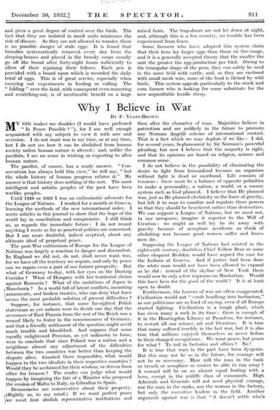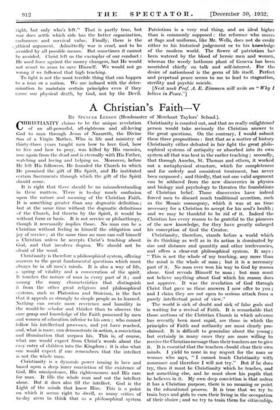Why I Believe in War
By F. YEATS-BROWN.
MY title makes me shudder (I would have preferred " Is Peace Possible ? "), for I am well enough acquainted with my subject to view it with awe and aversion. I do not want war in my time, or at any time, but I do not see how it can be abolished from human society unless human nature is altered ; and, unlike the pacifists, I see no sense in wishing or expecting to alter human nature.
The pacifist, of course, has a ready answer. " Con- servatism has always held this view," he will say, " but the whole history of human progress refutes it." My answer is that history does nothing of the sort. The most intelligent and artistic peoples of the past have been warlike peoples.
Until 1928 or 1929 I was an enthusiastic advocate for the League of Nations. I worked for a month at Geneva, learning the methods of the new international order. I wrote articles in this journal to show that the hope of the world lay in conciliation and compromise. I still think so, as regards the immediate future : I do not recant anything I wrote as far as practical polities are concerned. But I am more doubtful, indeed sceptical, about any ultimate ideal of perpetual peace.
The post-War enthusiasm of Europe for the League of Nations was largely a reaction to danger and discomfort. In England we did not, do not, shall never want war, for we have all the territory we require, and only by peace can we regain even a part of our former prosperity. But what of Germany to-day, with her eyes on the Dantzig Corridor ? What of Hungary with her territorial claims against Rumania ? What of the ambitions of Japan in Manchuria ? In a world full of latent conflicts, mounting armaments, and broken treaties, who can deny that force seems the most probable solution of present difficulties ?
Suppose, for instance, that some far-sighted Polish statesman as yet unborn were to decide one day that the severance of East Prussia from the rest of the Reich was a wound likely to fester in the consciousness of Germany, and that a friendly settlement of the question might avert much trouble and bloodshed. And suppose that some equally enlightened Prussian, as yet unknown to fame, were to conclude that since Poland was a nation and a neighbour almost any adjustment of the difficulties between the two countries was better than keeping the dispute alive. Granted these impossibles, what would happen to the two idealists in their respective countries ? Would they be acclaimed for their wisdom, or driven from office for treason ? The reader can judge what would happen by imagining the fate of a Minister who proposed the cession of Malta to Italy, or Gibraltar to Spain. Democracies are conservative about their property.
`( (Rightly so, to my mind.) If we want perfect peace we must first abolish representative institutions and then alter the character of man. Majorities believe in patriotism and are unlikely in the future to promote any Norman Angel scheme of international control. That is a fact which we may deplore if we like : I did, for several years, beglamoured by Sir Norman's powerful pleading, but now I believe that the majority is right, and that its opinions are based on religion, science and common sense.
I do not believe in the possibility of eliminating the desire to fight from humankind because an organism without fight is dead or moribund. Life consists of tensions : there must be a balance of opposite polarities to make a personality, a nation, a world, or a cosmic system such as God planned. I believe that He planned war, just as He planned electricity or the force of gravity, but left it to man to canalize and regulate these powers so that they should be beneficent rather than destructive. We can support a League of Nations, but we must not, in our arrogance, imagine it superior to the Will of Creation : we might as well try to do away with gravity because of aeroplane accidents as think of abolishing war because good women suffer and brave men die.
Supposing the League of Nations had existed in the eighteenth century, doubtless Chief Yellow Bear or some other eloquent Redskin would have argued the case for the Indians at Geneva. And if justice had been done the white man would not have been allowed to expand as he did : instead of the skyline of New York there would now be only a few wigwams on Manhattan. Would this have been for the good of the world ? It is at least open to doubt.
Furthermore, the horrors of war are often exaggerated. Civilization would not " crash headlong into barbarism," as our politicians are so fond of saying, even if all Europe started fighting. Civilization is a tough plant, which has riven many a rock in its time : there is enough of it in the Huntingdon Library at Pasadena, for instance, to restart all our science, art and literature. It is true that many suffered terribly in the last war, but it is also true that millions enjoyed themselves as never before in their changed occupations. We want peace, but peace for what ? To toil in factories and offices ? No !
It is true that wars in the past have been dysgenic. But this may not be so in the future, for courage will not be so necessary. How will the man in the tank or trench or aeroplane or cruiser be able to run away ? A coward will be on an almost equal footing with a hero, except in the middle class of commands. High Admirals and Generals will not need physical courage, nor the man in the ranks, nor the woman in the factory, but only the executive leaders in the field. Another argument against war is that " it doesn't settle who's right, but only who's left." That is partly true, but war does settle which side has the better ,organization, endurance and survival value. Finally, there is the Nsthical argument. Admittedly war is cruel, and to be avoided by all possible means. But sometimes it cannot be avoided. Christ left us the exemplar of our conduct : He used force against the money changers, but He would not resort to arms to save Himself. We would not go wrong if we followed that high teaching.
To fight is not the most terrible thing that can happen to a man or a nation. We arc imbued with the deter- mination to maintain certain principles even if they cause our physical death, by God, not by the Devil. Patriotism is a very real thing, and an ideal higher than is commonly supposed : the reformer who sneers at flags and uniforms, like Mr. Wells, does not do credit either to his historical judgement or to his knowledge of the modern world. The flower of patriotism has been watered by the blood of heroic men and women, whereas the weedy hothouse plant of Geneva has been nourished chiefly on talk and self-interest. For the desire of nationhood is the germ of life itself. Perfect and perpetual peace seems to me to lead to stagnation, sterility and psychic suicide.
[Next week Prof. A. E. Zimmern will write on "Why believe in Peace."]































 Previous page
Previous page